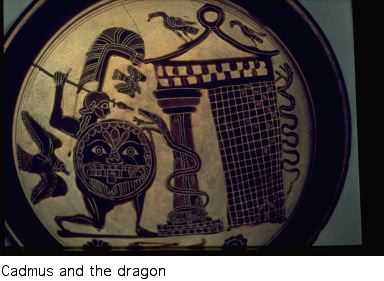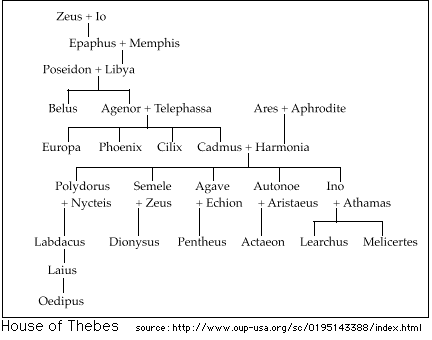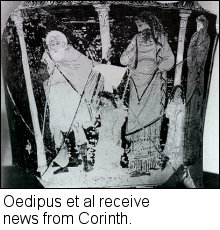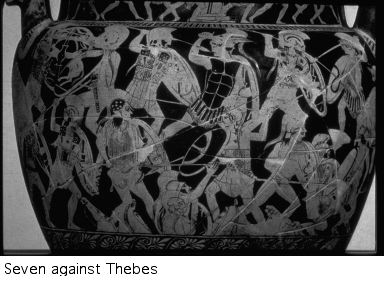|
Unit 7: Greek Theater Aeschylus Bio House of Atreus |
|
Aeschylus Help Page: Outline of Oresteia |
|
Unit 8: Sophocles Bio Oedipus as Tragic Hero House of Thebes |
|
Sophocles Help Page: Outline of Oedipus Rex |
| Return to Front Page |
| The House of Thebes | |
| According to most popular legend, though there are variations in different sources, Thebes was founded this way. The Phoenician princess Europa was carried off over the sea by a bull, and her father, Agenor, commanded his sons, including Cadmus, to find her. They all failed in their search, and while his brothers went on to found colonies of their own, Cadmus went to Delphi where the oracle told him to give up the search, find a cow with special markings, follow it, and found a city where it stopped to rest. | |
Cadmus wanted to sacrifice the cow to Athena (or Zeus), and sent men to the spring of Aretias to fetch water, but a dragon guarding the place killed them.  Cadmus then killed the dragon and, at the suggestion of Athena, sowed half of the dragon's teeth in the ground. Up sprang armed men, and in fear, Cadmus threw a stone in their midst. Each man thought that another one had attacked him, and they all fought. In the end, only five men, Oudaios, Chthonios, Echion, Pelor, and Hyperenor, survived and became the ancestors of the aristocratic families of Thebes. Cadmus then killed the dragon and, at the suggestion of Athena, sowed half of the dragon's teeth in the ground. Up sprang armed men, and in fear, Cadmus threw a stone in their midst. Each man thought that another one had attacked him, and they all fought. In the end, only five men, Oudaios, Chthonios, Echion, Pelor, and Hyperenor, survived and became the ancestors of the aristocratic families of Thebes.
|
|
| However, the dragon had been sacred to Ares, and, as punishment, Cadmus had to serve Ares for one year (or eight years). At the end of his servitude, he married Harmonia, the daughter of Ares and Aphrodite. The wedding was a grand spectacle, with the gods, the Muses, and the Charites ("Graces") attending, among others. Aphrodite (or Athena) gave Harmonia a divine necklace made by Hephaestus. This family heirloom brought great misfortune to their descendants. | |
 |
|
| Semele, mother of Dionysus, was destroyed when Zeus came to her in all his glory with lightning and thunder. Ino killed her children and then threw herself off a cliff. Acteon was turned into a stag by Artemis and then torn apart by his own dogs. Agave killed her son, Pentheus, ruler of Thebes at the time, while under the influence of Dionysus. | |
| After Pentheus died, Cadmus' final child, Polydorus, ascended to the throne of Thebes and married Nycteis. At this point, the legend of Thebes branches off in many directions and has many variants. Most important for us, Polydorus and Nycteis had a son named Labdacus, whose son, Laius, fled Thebes to take refuge with Pelops at Elis in the northwest Peloponnese. There, Laius fell in love with Pelops' son, Chrysippus. He lured Chrysippus out of town and raped him, then fled back to Thebes as Pelops cursed him for his transgression. When he returned, his father's successors to the throne of Thebes were dead, and the Thebans had Laius ascend to the vacant throne, where he married Jocasta. An oracle informed him that he would be killed by his own son, and, as a result, Laius refrained from intercourse with his wife, until one night, in a drunken rage, he had intercourse with her anyway. | |
| When Jocasta bore a son, Laius had his feet pinned together (to keep his ghost from walking) and ordered a shepherd to abandon the baby on Mount Cithaeron near Thebes. Instead, the shepherd gave the baby to a friend from Corinth. This friend delivered the baby to Polybus, king of Corinth, and he and his wife, Meriope, adopted the child, giving him the name "Oedipus", which seems to mean "swollen foot" or "sore foot". | |
| When he was older, a drunken man questioned Oedipus' parentage, though his mother would not speak to him about the matter. Instead, he went to Delphi to learn about his background, where the oracle instead told him that he would kill his father and marry his mother. Horrified, he abandoned Corinth, and headed towards Thebes where he decided to try his luck as an exile. On the way, a chariot ran him off the road and grazed his foot. In anger, Oedipus killed the driver, the passenger, and all of his retainers except one, who escaped. | |
| Upon arriving at Thebes, he encountered the monstrous Sphinx, possibly sent by Hera as punishment against the Thebans for failure to atone for the crimes of Laius. The Sphinx was eating Thebans. Before killing them, the monster posed a riddle: "What goes on four legs in the morning, two at midday, and three in the evening?" Only when the riddle was answered would the Thebans be spared the agony of the Sphinx, but no one had been able to solve the riddle. Laius had gone to Delphi to learn how to rid Thebes of the Sphinx, but reports of his demise by bandits came back to Creon, brother-in-law of Laius and acting ruler of Thebes. Creon decreed that whoever could solve the riddle would become the next king. Oedipus encountered the Sphinx and quickly realized that the answer was "man". The Sphinx, in her anger, threw herself off a cliff. | |
| Oedipus became king of Thebes and married Jocasta. She bore two sons, Polynices and Eteocles, and two daughters, Antigone and Ismene. A plague followed and the stage was set for the action of Sophocles' Oedipus Rex. (for a summary of the action of the play, see Outline of Oedipus Rex.) | |
 Following Oedipus' exile, his sons agreed to share the rule of Thebes, alternating in rule every year. However, Eteocles refused to give up his power after the first year and drove out Polynices. He fled to Argos, taking with him the gifts which the gods had given Harmonia at her wedding, including the necklace. Following Oedipus' exile, his sons agreed to share the rule of Thebes, alternating in rule every year. However, Eteocles refused to give up his power after the first year and drove out Polynices. He fled to Argos, taking with him the gifts which the gods had given Harmonia at her wedding, including the necklace.
|
|
| Meanwhile, in Argos, Adrastus, king of Argos, had learned from an oracle that he must "yoke his daughters to a boar and a lion." Confused at the oracle, he did not act upon it until one night when he heard a clamor coming from the court outside of his palace. He saw Polynices and Tydeus, an exile from Calydon, fighting. One of them had a boar painted on his shield, the other a lion. Adrastus immediately recognized the true meaning of the oracle, stopped the fight, and married his daughters to them. He further agreed to restore them to their homelands, starting with Thebes. | |
| Adrastus summoned heroes from Argos to lead the campaign against Thebes. Meanwhile, the exiled Oedipus, accompanied only by Antigone, made his way to the Grove of the Furies at Colonus, territory under the control of Athens. The inhabitants demanded that he leave before he defiled the grove, and they summoned Theseus, ruler of Athens. Ismene arrived, reporting on the fighting between Polynices and Eteocles, and she revealed that the Delphic oracle has declared that the city which possessed the bones of Oedipus could not be captured. Creon and Polynices both arrived to kidnap Oedipus, but Theseus made them leave, though not before Oedipus could curse Polynices. He then withdrew, blessed his daughters, and vanished before Theseus. | |
| As Adrastus and the army approached Thebes, they sent Tydeus on ahead to try to talk Eteocles into abdicating the throne. He entered the city, defeated all the best Thebans at wresting, and killed all but one of the fifty men who were set in ambush to overwhelm him. | |
| In the battle at Thebes, there were seven heroes on each side, and seven gates of the city. The Thebans learned from the seer Tiresias that only if Menoeceus, Creon's son, were sacrificed to Ares could they win the war. Menoeceus gladly killed himself outside the city. The Thebans drew lots to determine which gates they would defend. Eteocles wound up defending the gate which his brother, Polynices, was attacking. | |
 The Thebans were soon forced from the battlefield into the city. One hero climbed atop the walls and proclaimed that even Zeus could not stop him. Shortly thereafter, he was struck by lightning. The tide of battle then began to turn against the Argives. Melanippus, one of the Theban heroes, dueled with Tydeus and both were mortally wounded. Athena obtained from Zeus a potion of immortality for Tydeus, but Amphiaraus, still angry at him for favoring the war, knew what was happening. He cut off Melanippus' head and gave it to Tydeus, who, in his rage, scooped out the brains and drank down the blood. Athena saw this when she arrived and dropped the potion in her disgust. Tydeus died, and Amphiaraus fled the scene. He was about to take a spear in the back when Zeus opened up the earth and had him swallowed alive. In classical times, a shrine was established there which housed his oracle. The Thebans were soon forced from the battlefield into the city. One hero climbed atop the walls and proclaimed that even Zeus could not stop him. Shortly thereafter, he was struck by lightning. The tide of battle then began to turn against the Argives. Melanippus, one of the Theban heroes, dueled with Tydeus and both were mortally wounded. Athena obtained from Zeus a potion of immortality for Tydeus, but Amphiaraus, still angry at him for favoring the war, knew what was happening. He cut off Melanippus' head and gave it to Tydeus, who, in his rage, scooped out the brains and drank down the blood. Athena saw this when she arrived and dropped the potion in her disgust. Tydeus died, and Amphiaraus fled the scene. He was about to take a spear in the back when Zeus opened up the earth and had him swallowed alive. In classical times, a shrine was established there which housed his oracle.
|
|
| Eteocles and Polynices met in combat and killed each other. The battle raged on, and only Adrastus escaped death. What happened next is recounted in Sophocles' Antigone, which we will be reading for unit 9. | |
| Adrastus fled to Athens. Theseus took pity on him, and led an expedition to Thebes, where he forced the Thebans to allow the Argives to bury their dead. | |
| Ten years later, the sons of the original seven heroes who fought against Thebes organized another expedition, they took Thebes, sacked it, and destroyed it. The city is not heard from again. | |
|
Works Cited: Gantz, Timothy. Early Greek Myth. The Johns Hopkins University Press, 1993 Powell, Barry B. Classical Myth. Prentice-Hall, Inc. 1998. Green, Richard and Eric Handley. Images of the Greek Theater. London, 1995: Trustees of the British Museum |
| Timeline of Relevant Events |
|
|
|
Copyright 2000-2020 Peter T. Struck. No portion of this site may be copied or reproduced, electronically or otherwise, without the expressed, written consent of the author. |